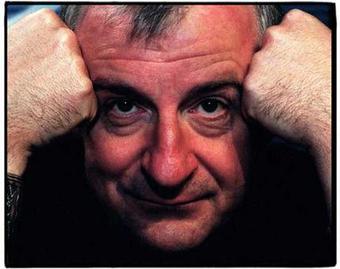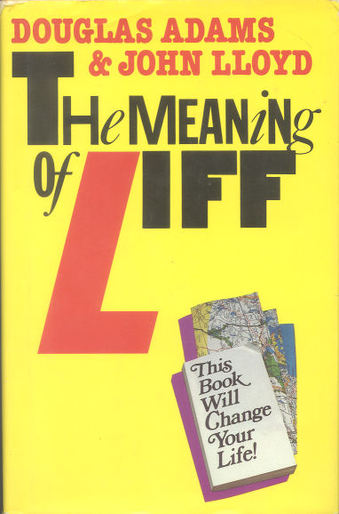7 Awesome Things That Douglas Adams Did (Besides the Hitchhiker’s Guide)
 |
?Unfortunately, Douglas Adams is still dead. He’s been this way since he died following a workout at his gym in Santa Barbara, California on May 11, 2001. He had moved from his home in England to the States with his wife and young daughter to get a film version of The Hitchhiker’s Guide to the Galaxy completed after years of development hell (we all know how that turned out). Like Jim Henson before him, Adams was a huge thinker and a true larger than life personality who died suddenly and left behind a grief-stricken fan base and a powerful legacy. He will always be best known for his peerless work on The Hitchhiker’s Guide to the Galaxy radio series and its offshoot novels, LPs, computer game, television series, tie-in towel and so on. That achievement alone would have earned him pop culture immortality. But despite a legendary inability to make deadlines — one that is an inspiration to writers everywhere — Adams actually did achieve quite a lot more than just Hitchhiker’s in his 49 years. Here’s a look at the seven most noteworthy things that he did that have nothing to do with The Hitchhiker’s Guide to the Galaxy. So read on all of you hoopy froods. Just put your towels away, you won’t be needing them today.
7) Monty Python’s Flying Circus
This one is a bit of a cheat as Douglas Adams’ work with Monty Python’s Flying Circus obviously predates the creation of The Hitchhiker’s Guide to the Galaxy. Yet his brief involvement with the show — which only consisted of the above sketch that aired in the series’ final year, two on-screen appearances during that same John Cleese-less season and a witty bit on the Monty Python and the Holy Grail tie-in LP about a film producer who swears that a very dead Marilyn Monroe is starring in his new film — helped Adams forge lifelong friendships with the Pythons. The most notable of these was with Graham Chapman, with whom Adams collaborated on a number of interesting projects that never got of the ground (I’m still hoping the Adams/Chapman penned script intended for Ringo Starr resurfaces one of these days). Later in his career, Adams enlisted the help of Python pal Terry Jones to novelize his Starship Titanic computer game. The resulting book is a bizarre fusion of Python-esque humor and Adams’ style that is nowhere near as bad as its reputation suggests. Ultimately, Adams really had an inconsequential impact upon the Pythons’ career trajectory and vice versa. But the brief crossover between the two is the sort of strange collaboration that gets comedy nerds salivating. Thusly, it is more than worthy of mentioning here.
6) Hyperland/The Hitchhiker’s Guide to the Future
5) Doctor Snuggles
Doctor Snuggles was a short-lived, very European animated series that featured Peter Ustinov as the voice of the titular scientist, a kindly bumbling sort who cared for everyone he encountered. The 13 episodes of the series are so outrageously twee that you fully expect a zine-making competition to erupt between members of The Pains of Being Pure at Heart and Blueboy at some point (to put it another way for those of you who aren’t well versed in the wonders of late-1980s/early-1990s indie pop, let’s just say that the show was like an adorable tickle party in which Gizmo and Hello Kitty held court for hours). Douglas Adams and frequent collaborator John Lloyd wrote the episodes “The Remarkably Fidgety River” and “The Great Disappearing Mystery” for the series. Unavailable on DVD in the U.S., they have been recently added to YouTube lately in the exact kind of flagrant disregard for copyright that caused this whole SOPA/PIPA mess the first place. The rights holder’s loss is our gain however as both of the episodes are mini-masterpieces in which a number of Adams’ trademark huge ideas are on display. Take for example the aptly named Get Lost Machine. This was a device in that was “deliberately designed so that you never knew where you were going.” In “The Great Disappearing Mystery,” Snuggles reasons that you can never find missing people by looking out in the open, so the only way to track down those who have vanished is to misplace yourself. The concept is Adams at his most whimsical and wouldn’t feel out of place in any of his novels. The same holds true for “The Remarkably Fidgety River,” which has an equal assortment of inventiveness on display. In this tale (which you can watch in its entirety above), a river hides in a cave because someone is stealing chunks of the sea. Surprise! It turns out that aliens are to blame. It seems that the ETs thought because there was so much trash and pollution in Earth’s oceans than mankind didn’t want their water supply so they took it for themselves. Interestingly enough, both of these stories feature ecological and environmental messages that foreshadowed what Adams felt to be the most important accomplishment of his career. More on that later.
4) The Meaning of Liff
 |
?Cultural anthropologists will go on and on about how things like Trivial Pursuit and Cabbage Patch Kids impacted life in the 1980s. But what I want to know is why people were so obsessed with creating phony words during the Reagan era. In the United States we had Rich Hall’s Sniglets. These words that “aren’t in the dictionary but should be” became a bit of a cottage industry for the comedian after the segment became hugely popular on HBO’s Not Necessarily the News. Around the same time over in the UK, Douglas Adams and John Lloyd were creating terms for what they felt were “common experiences, feelings, situations, and even objects which we all know and recognize, but for which no words exist.” The pair released two books of these goofy diversions: The Meaning of Liff and The Deeper Meaning of Liff. These contained funny words like “Goadby Marwood” — a noun used “for someone who stops John Cleese on the street and demands that he does a funny walk.” Originally printed in 1983 and 1990 respectively, both of these predated the Urban Dictionary. Just another example of how forward-thinking Adams was.
3) Dirk Gently’s Holistic Detective Agency
Long live the Electric Monk! Dirk Gently’s Holistic Detective Agency had the deck stacked against it right out of the gate. As his first non-Hitchhiker’s Guide work of fiction, Adams had to deal with fans wondering what was up with the new book’s cumbersome title and, more importantly, why the fuck Arthur Dent didn’t appear in it. Was it successful? Sure, but it just wasn’t a cultural touchstone like Adams’ previous works. The arguably better sequel novel, The Long Dark Tea Time of the Soul — a book that some fans assumed was another Hitchhiker’s entry due to its title being taken from a line in Life, the Universe, and Everything — was also well-written and underappreciated during the time of its original release. Time has been kind to Dirk, with the character’s two adventures being a more consistently enjoyable read than some of the Hitchhiker’s works (So Long and Thanks for all the Fish, I’m scowling in your direction). Later this year, the BBC will feature three more Dirk Gently TV episodes that follow on from the pilot that aired back in 2010. The less easily riled up Gently fanbase means that Misfits creator/writer Howard Overman can stray a bit from the source material without having to be brutally eviscerated by uppity fanboys for not being 100% true to Adams’ every word. If you have somehow overlooked the Gently books, by all means check them out already. They are unique not only in terms of being different from anything else Adams wrote, but most anything else you are liable to read as well.
2) Doctor Who’s “City of Death”
At some point you’ve probably been caught up in a discussion about where your Doctor Who-ignorant friend should start watching the series. Usually people decide upon either “Rose” or “The Christmas Invasion” for their introduction to everybody’s favorite time-traveling Gallifreyan. Not me. As far as I’m concerned there is no single more entertaining episode of Doctor Who — old or new — than “City of Death.” Written by Adams and two others under a shared pseudonym, the adventure concerns a suave alien posing as a Parisian culture vulture who plans on selling forged yet also legitimate (don’t ask) copies of the Mona Lisa to fund his maniacal plans. At the heart of “City of Death” is a genuinely satisfying sci-fi story spanning 400,000,000 years, and one that is propelled along by a jaunty script and Tom Baker’s exceptionally gleeful performance. That coupled with John Cleese’s inspired cameo and this is a Who installment for the ages. Adams also wrote the Hitchhiker’s Guide-referencing “The Pirate Planet”
and the infamous lost episode “Shada,” both of which are interesting for various reasons. Start with “City of Death” and eventually you can work your way to the others mentioned here. Depending on your time travel mode of choice that is.
1) Last Chance to See
Co-written with zoologist Mark Carwardine, Last Chance to See was Douglas Adams’ most surprising work. It could very well be his best as well. The non-fiction travelogue had Adams and Carwardine attempting to track down a variety of endangered species. The project originally began life as a BBC radio series before morphing into a book that Adams considered to be his greatest career accomplishment. It’s easy to see why he thought this way. His trademark humor is as sharp as ever here, but this time it is underscored by an urgency and sadness that is missing from the rest of his bibliography. (With the exception of Mostly Harmless‘ controversial and bleak ending). Take for example the “Sifting Through the Embers” chapter that closes out Last Chance to See. In it, an allegorical tale of man’s ignorance plays out that compels the reader to think about the global devastation that takes place every day. The seeds of environmentalism planted in Adams’ Doctor Snuggles days are in full bloom by this point. More than just being funny or informative, the book is a call to arms for every reader to take action to do his or her part to make things better while we can. At no point does his message feel heavy handed though. Instead it comes off as a gentle warning from someone who has witnessed and experienced things that none of us can imagine. Even with Adams gone, his subtle activism here continues to inspire. That doesn’t make his death any less of a bitter bill to swallow but at least it’s something.
